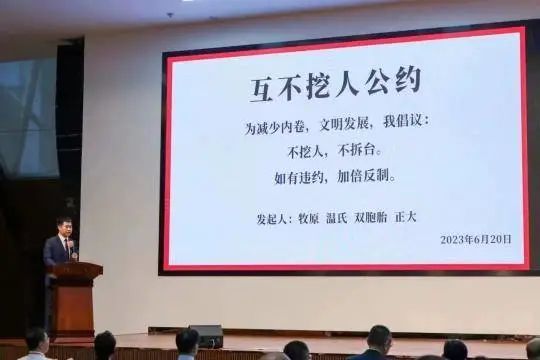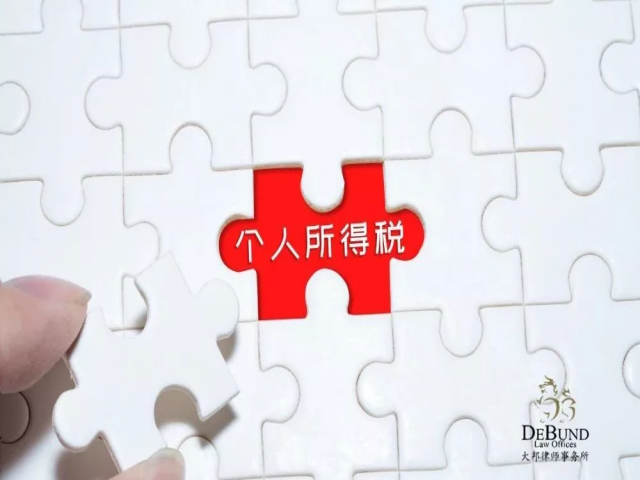Are Pig Breeding Businesses under Non-poaching Pact Really Reckless to Face the Risk of Ten Billion Penalties for Monopolies?
According to a media report, Muyuan Group, a big pig breeding business announced a non- poaching pact among Muyuan, Wens, Twins, Chai Tai and other big businesses, advocating no poaching, less competition and sound development in the industry, stating any violation will result in retaliation. I couldn’t help feeling surprised for the pact probably violating the Anti- monopoly Law and resulting in a penalty of hundreds of million to tens of billion RMB.

Translation of the picture above:
Non-poaching pact
In order to reduce internal competitions and develop in sound environments, we advocate: Non-poaching and no sabotage
Any violation will result in retaliation Advocator: Muyuan, Wens, Twins, Chai Tai
June 20th 2023
In the Anti-monopoly Law, if a business concludes and performs a monopoly agreement illegally, the anti-monopoly Law enforcement authority should order it to stop the illegal activity, confiscate illegal profits and impose a penalty of 1% to 10% of last year’s sales......and if the monopoly agreement is not performed, the penalty could be below RMB three million. The listed companies of Muyuan Group had 120 billion RMB revenue in 2022, Wens and Twins had over 80 billion RMB revenue each in 2022 and Chai Tai had over 180 billion RMB revenue in 2021. If the non-poaching pact is performed and found to have violated the Anti-monopoly Law by the regulatory authority. These companies could face penalties of over 40 billion RMB or at least over 4 billion RMB. Even if the pact is not performed, each of them could face a fairly high penalty of below 3 million RMB. I would like to discuss it with you now.
I. Legal issues connected with the non-poaching pact among the pig breeding businesses
Transparency, fairness and justice are critical for competitors in the market. The biggest problem is that the agreement among these businesses blocks competition. Poaching without violating law or infringing trade secrets or intellectual property rights is a normal act of market competition that could help labor, talents, technology and other market elements flow freely and blend and increase the intensity of competition among businesses. Advantages of competition include social development and advancement, faster technology upgrading, price decrease and pay rise for competent employees. Consumers and employees also benefit from competition.
Businesses need to offer higher salaries to poach employees from their rivals. It is legal for a business to announce that it does not poach any employee from its rivals. If several big businesses in an industry act together under a non-poaching pact, this means they collude with each other and form an alliance to control salaries in a way that is typical of cartel, possibly causing employees not able to bargain salaries fairly with employers and harming employees’ legal interests. As the competition environment is getting worse, the businesses would be affected adversely with their research and development suffering more difficulties, technology upgrading more slowly and efficiency decreasing, harming consumers’ rights and benefits they should have had from competition and innovation.
Nothing is new in the sun. There was a similar case in the US over ten years ago. The businesses involved included Apple, Google, Intel, Adobe, Pixar Animation, Intuit, etc. Initiated by the well- known person Steve Jobs, bilateral or multilateral non-poaching agreements were signed among the businesses. The Us Department of Justice brought an anti-monopoly action against them. The affected employees brought a civil compensation action. Eventually, the businesses agreed to abandon the agreements and settled with the US Department of Justice. In the civil compensation case, they settled by paying over USD 400 million to the plaintiff.
II. Legal issues connected with the “non-poaching pact” under the Anti-monopoly Law
We may think of labor laws when it comes to the control of the market price of employees. However, Chinese labor laws and employment contract laws are mainly intended to deal with issues arising from relationship between the employer and its employees and include no provisions connected with collusion in pay cuts, in which case the Anti-monopoly Law applies.
First, the Non-poaching Pact among the pig breeding businesses is a concerted effort to reach an agreement to prevent or restrict competition and therefore is a monopoly agreement under the Anti-monopoly Law. Second, this is a type of other monopoly agreements defined by the anti- monopoly law enforcement authority of the State Council.
In this case, if the affected employees sued the companies or requested the State Administration for Market Regulation investigate them, we can refer to the Anti-monopoly Law to deal with the issue of whether the Anti-Monopoly Law applies to the Non-poaching Pact and points of defense for the businesses and reasons for these points.
1. Influence on the market
The Anti-monopoly Law is mainly used to regulate business activities that may adversely affect competition. The business influence on the market is one of the main factors that should be considered when deciding if the Anti-monopoly Law applies. In Article 18, monopoly agreements are not prohibited among businesses that have shares on the market below the minimum level and meet other conditions set by the anti-monopoly law enforcement authority of the State Council.
In this case the market means the pig breeding market of the Chinese mainland where key competitors include Muyuan, Wens, Twins and Chai Tai. The ranking list for pig companies in 2023 showed that Muyuan, Wens and Twins were among top 5 businesses in China according to the number of female pigs in stock. Chai Tai with its production base in China, not on the ranking list for Chinese businesses had the world’s fourth largest number of female pigs in stock. All of them have great influence on the market. The vertical monopoly agreement concluded among competitors like them is governed by the Anti-monopoly Law.
In the exposure version of the Regulations of Prohibiting Monopoly Agreements by the State Administration for Market Regulation in 2019, the clauses 7 through 11 are not applicable to agreements among businesses competing with each other....and an agreement among businesses that have altogether less than 25% shares of the market....and an agreement among businesses none of which has over 25% shares of the market could be presumed not to prevent or restrict competition unless otherwise shown by evidence to the contrary. After the exposure version took effect, the businesses could be exempted from regulatory punishment with evidence of being within the market share limits. This “safe harbor” clause was not included in the official version of the Provisional Regulations of Prohibiting Monopoly Agreements or the Regulations of Prohibiting Monopoly Agreements 2023. So, the non-poaching pact could not be exempted from regulatory punishment for being within the market share limits.
2. Purpose of the non-poaching pact
I could sometimes see clauses requiring neither company hire employees leaving from the other, especially ones bound by competition restrictions when reviewing contracts for my clients years ago. However, there are basic differences in this type of clauses and the non-poaching pact among the pig breeding businesses in this case.
First, the clause in my client’s contract is intended to protect their own intellectual property rights and trade secrets, while according to the news report in PPT format, the non-poaching pact among the pig breeding businesses is intended to “reduce pressure from competition and help sound development in the industry”, which to be brunt, means to reduce labor costs. Second, my client’s contract is a bilateral agreement among businesses under cooperation, while the non- poaching pact is a multilateral agreement among several companies in important positions in the industry.
The pig breeding businesses could explain with proof that the pact is intended to protect intellectual property rights and trade secrets. If the effect of the pact is setting competition rules instead of damaging competition, the violation of the Anti-monopoly Law could be less severe, at least partially.
3. Is recession a legal reason for violation of the Anti-monopoly Law?
The news report about the non-poaching pact among the pig breeding businesses says that pig breeding businesses have been suffering decrease in the ability to gain profits and increase in losses since pig prices slumped in the third quarter of 2022......as the quality of development is prioritized nowadays, the key to gain competitive advantages in the pig breeding industry is cost control based on talents and technology, so poaching will certainly have direct impact on pig breeding businesses.
In Article 20 of the Anti-Monopoly Law, responsibility for the monopoly agreement could be exempted in seven events, of which the fifth one is related to the above, in which the monopoly agreement is performed as a result of great decrease in sales or excessive goods in stock during a recession. Based on causal relationship, when deciding if the act should be found as the law violation, this clause could not be used a legal reason for exemption of punishment for the non-poaching pact under the Anti-monopoly Law. If the regulatory authority finds the non-poaching pact as illegal, a less severe punishment could be given on the ground of recession, losses of the industry or excessive goods in stock.
Finally, some people may say this article is exaggerating. In this case, the horizontal monopoly agreement is not a serious violation. The industry is in recession. Even if the non-poaching agreement is performed, the regulatory authority is not very likely to investigate and punish the businesses involved in the current situation. I agree. However, the risk is there. Punishment may be given in the future. For instance, Alibaba paid the 18.2 billion RMB penalty in 2021 six years after it started to violate the “two options” clause of the Anti-monopoly Law in 2015. If pig prices rise years later and the pig breeding business booms, the big businesses in the industry could be punished for the monopoly agreement signed this year. This is a risk they cannot afford to ignore.
What should they do next? In brief, if the non-poaching pact is performed, the big breeding businesses should take remedial action to reduce the penalty by studying the Anti-monopoly Law and relevant laws, especially the Guide to Application of Leniency Policy in Horizontal Monopoly Agreement Cases by Anti-Monopoly Commission of State Council, submitting full, updated and accurate reports and important evidence connected with the monopoly agreement, especially ones unknown to the law enforcement authority and fully cooperating in the investigation. A 1% penalty reduction equals to hundreds of a million RMB less than that calculated on the basis of the previous year’s sales.











 沪公网安备 31010602001694号
沪公网安备 31010602001694号